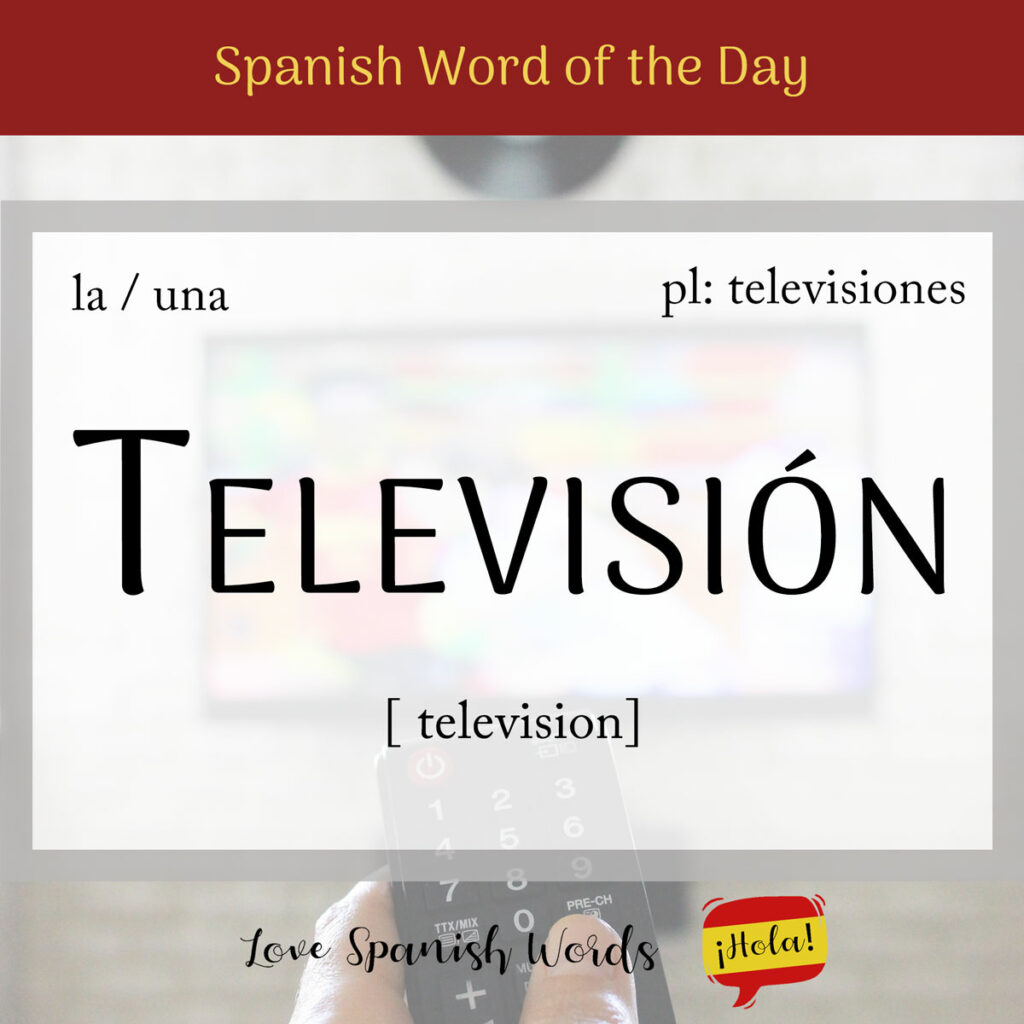The English word television is easy to remember in Spanish because it’s spelled in almost the same way and sounds similar – televisión. The origins of the word come from Greek and Latin. Tele derives from the Greek word τῆλε (tēle) which means far or at a distance and visión comes from the Latin word visio meaning sight.
The word can be interpreted as vision at a distance. It was coined to describe the new form of communication that allowed images to be transmitted at long distances.
Latin American Pronunciation
European Pronunciation

Televisión is a feminine noun. Below are the definite and indefinite articles for this word.
- la televisión = the television
- las televisiones = the televisions
- una televisión = a television
- unas televisiones = some televisions
There are many words in Spanish related to the televisión. Most of them use the first part of the word tele. Here are some of the most common words you may hear:
- televidente = viewer
- televidencia = television viewing
- teletransmisión = teletransmission
- televisión en streaming = streaming television
- televisión por cable = cable TV
- televisión por satélite = satellite TV
- televisión digital = digital television
- telerrealidad = reality television
- telecomedia = comedy TV
- telebasura = trash TV
- telefilm = TV movie
- teleserie = TV series
- telemaratón = TV marathon
- telediario = newscast
- teletransmisión = teletransmission
- teleprompter = teleprompter
- teleconferencia = teleconference
Yo no tengo tiempo para ver televisión
I don’t have time to watch television.
There are other names that the televisión goes by. Similar to how we say TV in English, TV is also used in Spanish to shorten the name but uses the Spanish pronunciation and name of the letters T and V.
Another nickname for television is tele. In Spanish, it’s quite common to shorten not only people’s names but also objects. Many Spanish speakers will refer to the television as tele.
If that weren’t enough, the television is also referred to as televisor. This word is used more commonly in some Latin American countries than others but it’s a bit more old-fashioned and not used much by the younger generation.
One grammatical difference between televisión and televisor is that televisión is feminine (la televisión) and televisor is masculine (el televisor).
Another difference lies in their respective definitions. A televisor is a physical electronic device with a screen that receives the signal. The word televisión refers to the source of communication, which entails programming and the transmission of channels. It can be consumed on the televisor, tablets, computers, phones, or any other streaming device.
In reality, the big physical screen we use to watch our favorite shows in the living room is a televisor. However, it’s more common for us to call it a televisión. If you say “Prende la televisión” or “Prende el televisor”, neither sentence is wrong. The first sentence speaks about the physical screen, and the second one describes turning on the programming system.
La tele no quiere prender.
The TV does not want to turn on.
The concept of the televisión was first developed in the 19th century when imágenes estáticas (static images) were transmitted. Then in the 1920s, the first images were transmitidas (transmitted) on television. By the 1930s, comerciales (commercials) were introduced.
Televisión en color (color television) started being used in the 1950s, and by the 1960s, it expanded globally as a main source of comunicación (communication). Televisión por cable and satélite (cable and satellite TV) reached more homes during these years too.
The first type of televisión had transmisión analógica (analog transmission) that sent signals through ondas de radio (radio waves). Televisión digital (digital television) was introduced in the 1990s and it came with better image and sound. In recent years, alta definición (HD-high definition) was introduced and came with even better resolución de imagen (image resolution).
With technología (technology) improving every year, we now have options such as 4k (cuatro k) and 8k (ocho K). They offer even better resolución de imagen (image resolution) and claridad (clarity).
El televisor de mi hermana tiene resolución de 8k.
My sister’s television has 8k resolution.
The newest addition to television technology is the Smart TV. Although the literal translation in Spanish is televisión inteligente, it is referred to by its English name, Smart TV. These televisiones connect to internet (internet), have navegación web (web navigation), integrate servicios de streaming (streaming services), and you can descargar aplicaciones (download apps).

The literal translation for streaming is transmisión. But when talking about streaming services, the English name for streaming is used more commonly. It becomes servicios de streaming instead of servicios de transmisión.
Some types of canales (channels) we watch include:
- canales de entretenimiento = entertainment channels
- canales de medios de información = information media channels
- canales de educación = entertainment channels
- canales de publicidad = publicity channels
- canales de deportes = sports channels
Mi hermano solo ve canales de deportes en la televisión.
My brother only watches sports channels on the television.

Spanish idiomatic expressions featuring ‘televisión‘
“La caja tonta” (the dumb box) is a humorous and critical way to refer to the television. It suggests that this ‘box’ is a useless distraction that makes you tonto/tonta (dumb).
Salir en la tele
Literal translation: to come out on TV
English meaning: to appear on TV as part of a program (usually used as a form of admiration)
Estar pegado a la tele
Literal translation: to be glued to the TV
English meaning: a reference to someone who spends a lot of time watching TV and pays no attention to anything else
Ver la tele de fondo
Literal translation: to watch the TV in the background
English meaning: to have the TV on as background noise while doing other things such as homework
Estar pasado de moda como la tele en blanco y negro
Literal translation: to be out of fashion like black and white TV
English meaning: to be old-fashioned

